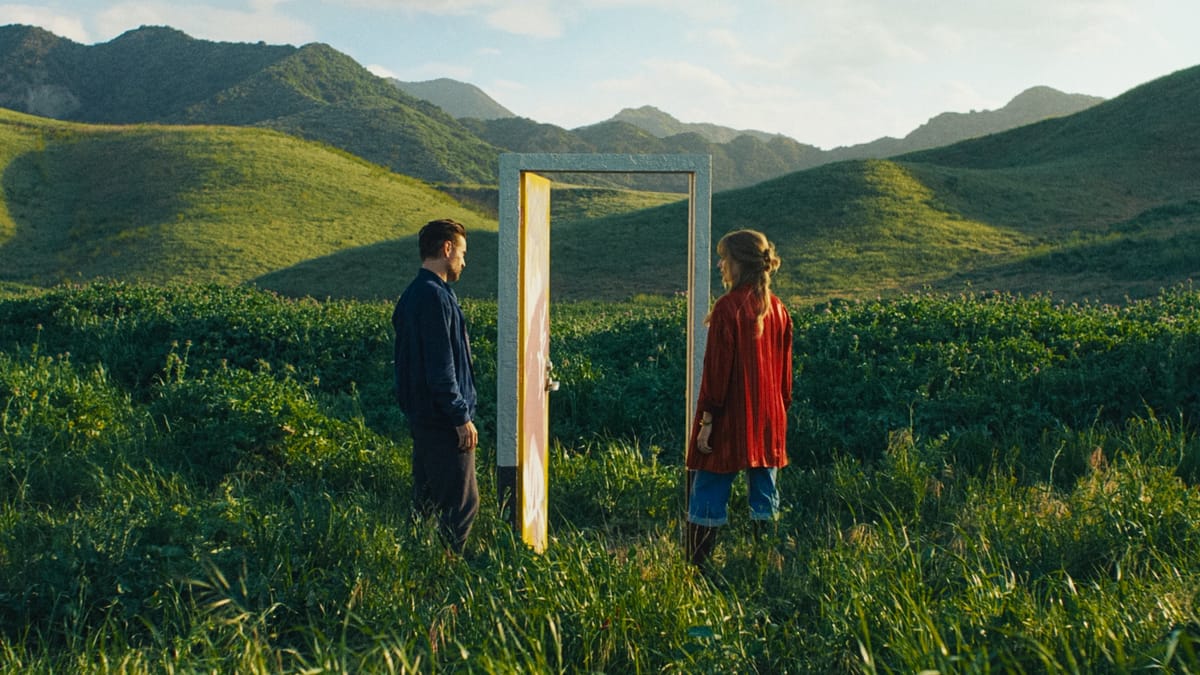A Big Bold Beautiful Journey
"You can drive yourself crazy trying to be happy. Be content first."

Kogonada's first two features (Columbus and After Yang) are defined by deliberate pacing. There are long stretches of silence, a meandering camera that luxuriates in every image, a soft and unobtrusive yet effective score, and a plot focused on exploring its subjects and their expanding relationship. Characters only speak when they have something meaningful to say, so they're sure to craft a beautiful and clear piece of poetic prose, as if their thoughts are their most valued possessions. He makes it so tempting, so easy to get lost in the worlds he created, one a slice of our own and the other not far from it. Upon conclusion, it's as if you're waking from a trance, slowly returning to the bustle of the real world.
If you came into A Big Bold Beautiful Journey expecting a similar experience, you will quickly be disabused of that notion. Scenes are short and choppy, locations are not terribly specific, and the whole beginning feels like an extended montage, moving efficiently through a checklist to set up the core of the plot. It's as if Kogonada doesn't want you to think too hard about the artificiality of a world in which the only car rental agency is called, well, The Car Rental Agency, or that their only cars are two Saturns from 1994. Although with how central similar constructions are to the engine of the plot, there's no chance it will entirely pass you by. The catalyst for the titular journey is the car's GPS directing David (Colin Farrell) back to Sarah (Margot Robbie), with whom he just struck out at a wedding. Their ensuing road trip takes them between various free-standing doors that transport them into key moments in their past. As if that's not enough, there are a handful of moments when the veneer of reality completely drops away in arresting and confusing fashion, complicating the very nature of the story we're witnessing.
Further preventing those intentional contrivances from landing is the stilted and strangely phrased dialog, another element that is slyly lampshaded early on. Sarah especially speaks in the grand prose of someone allergic to small talk, demonstrating her penchant for self-reflection and crafting justifications for alienating those to whom she becomes the least bit close. If we had more time in each interaction to steep in the stylized language, maybe it could have worked. But as is, you're given almost no time to adjust to the rhythms in any one moment before the next one begins, so it takes quite a while to lock in.
The few scenes given appropriate time to breathe provides ample evidence that Kogonada still has it. Longer, heartfelt conversations, uninterrupted by action or intercutting or an outside force, do pack an emotional punch. David with his dad (Hamish Linklater) in the hospital, David and Sarah under the night sky, even their first real conversation over fast food hamburgers. They provide the grounding to see the bigger ideas the movie is pushing. The central metaphor is quite literal, so it's these conversations that begin to explore the nooks and crannies of what it means. David has long been plagued by resentment towards his parents for holding him up as "special", which has only led to disappointment and feelings of inadequacy. Sarah cannot stop running from her failure to be by her mother's side as she died in the hospital. The story gives them both an opportunity to reckon with these fundamental experiences, elevating their emotional journey from trite to thoughtful.
If only those took up more of the runtime. The time spent in the car or traversing each other's past is overwhelmed by all the other action, including a strange, proper action set-piece. Our attention is diverted from the natural charisma of the wonderful leads, who are never given time to shine, and thus come off flat. And the business with the doors is played as a Charlie Kaufman-esque quirk, but the movie refuses to lean hard enough into the humor or pathos or absurdity to pull it off. There are aspects that do find purchase; Phoebe Waller-Bridge as the cheerful and bizarrely aggressive clerk at the Agency comes to mind as a particular bright spot. But the promise of the opening only ever comes close to realization in the momentary, mid-movie breakdown of the facade, before soon being buttoned back up for the rest of the unsatisfying tale.
The most emblematic scene of the movie comes when Sarah and David are both forced to confront past romantic partners. After so much time spent looking at their past and hearing bits and pieces of their self-assessments, we already have a sense of their self-doubt. So to see them at separate ends of a pub laying it out so bluntly is redundant. It's a scene that smacks of a filmmaker's lack of confidence in the audience's understanding of characterization. That said, it's wonderfully staged, and uses some lovely editing to craft a unique composition that cannot help but be as interesting to look at as it is unnecessary to our understanding.
The only piece of the movie that fully delivers on the movie's premise is the magnificent score from the legendary Joe Hisaishi, best known for his collaborations with Hayao Miyazaki. He brings a soaring, mournful, achingly beautiful tone to the experience, and paints a more vivid picture of the landscape than anything on camera. It's a piece of orchestration too good for the film that contains it, as it suggest so much more depth and humanity than its surroundings ever achieve. As a result, its proximity to mediocrity is tragic, as it's just one piece of a bigger, far muddier tapestry, giving us just a taste of what could have been.